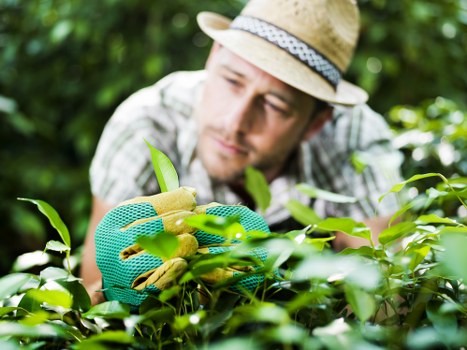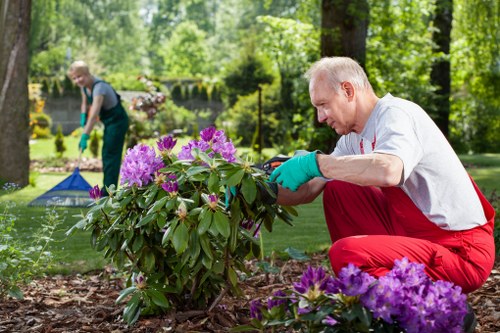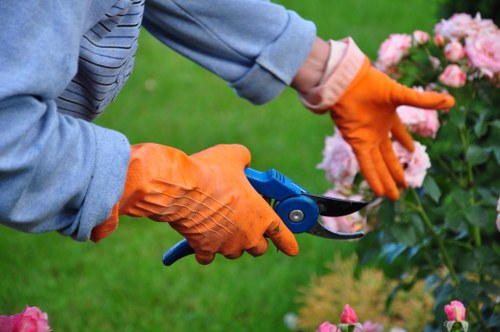Comprehensive Guide to Garden Maintenance in Aldgate
Introduction to Garden Maintenance

Maintaining a beautiful garden in Aldgate requires dedication, knowledge, and the right tools. Whether you are a seasoned gardener or a beginner, understanding the essentials of garden maintenance can transform your outdoor space into a vibrant oasis.
Garden maintenance involves a range of activities from planting and pruning to pest control and lawn care. Each task plays a crucial role in ensuring that your garden remains healthy and aesthetically pleasing throughout the year.
In Aldgate, the unique climate and soil conditions present both challenges and opportunities for garden enthusiasts. By tailoring your maintenance practices to suit the local environment, you can achieve remarkable results.
Seasonal Garden Care

Seasonal care is vital for the longevity and beauty of your garden. Each season brings its own set of tasks that need to be addressed to keep your garden thriving.
Spring is the perfect time for planting new flowers and shrubs. It's also the time to prepare your garden beds and ensure that your soil is rich in nutrients.
During summer, focus on regular watering and controlling weeds. Proper irrigation and mulching can help retain moisture and reduce the growth of unwanted plants.
Essential Gardening Tools

Having the right tools is essential for effective garden maintenance. Here are some must-have tools for every gardener in Aldgate:
- Pruning shears
- Lawn mower
- Garden fork
- Watering can or hose
- Gloves and protective gear
Investing in high-quality tools not only makes your gardening tasks easier but also ensures the longevity of your equipment.
Regular maintenance of your tools, such as cleaning and sharpening, can enhance their performance and extend their lifespan.
Pest and Disease Management

One of the biggest challenges in garden maintenance is managing pests and diseases. Identifying and addressing these issues promptly can prevent significant damage to your plants.
Implementing integrated pest management (IPM) strategies can help maintain a healthy garden. This includes monitoring pest populations, encouraging beneficial insects, and using environmentally friendly treatments when necessary.
Maintaining proper sanitation, such as removing dead plant material, can reduce the risk of disease outbreaks in your garden.
Landscape Design Tips

Effective landscape design not only enhances the beauty of your garden but also improves its functionality. Consider the following tips when planning your garden layout:
- Assess the sunlight and shade patterns in your garden.
- Choose plants that are well-suited to Aldgate’s climate.
- Incorporate a mix of perennials and annuals for year-round interest.
- Create focal points with decorative elements like benches or fountains.
A well-designed landscape can make maintenance easier and more enjoyable.
Regularly reviewing and updating your garden design can keep your outdoor space fresh and inviting.
Watering and Irrigation Systems
Proper watering is crucial for the health of your garden plants. Understanding the specific water needs of different plants can prevent under or over-watering.
Installing an efficient irrigation system can save time and water. Drip irrigation and soaker hoses are excellent options for targeted watering.
It's important to water your garden early in the morning or late in the evening to reduce evaporation and ensure that plants receive adequate moisture.
Soil Health and Fertilization
Healthy soil is the foundation of a thriving garden. Regularly testing your soil can help you understand its composition and nutrient levels.
Adding organic matter, such as compost or manure, can improve soil structure and fertility. This enhances the growth and resilience of your plants.
Fertilizing your garden appropriately, based on the specific needs of your plants, promotes robust growth and vibrant blooms.
Lawn Care Tips
A well-maintained lawn adds significant value and beauty to your garden. Regular mowing, aeration, and fertilization are key components of effective lawn care.
Ensure that your lawn receives adequate sunlight and is free from pests and diseases. Overseeding can help maintain a dense and healthy turf.
Proper lawn care practices not only enhance the appearance of your garden but also contribute to the overall ecosystem by supporting beneficial insects and wildlife.
Pruning and Trimming Techniques
Pruning is essential for maintaining the shape and health of your plants. It encourages new growth and prevents overgrowth that can obstruct sunlight and air circulation.
Always use sharp and clean tools to make precise cuts, reducing the risk of disease transmission between plants.
Prune flowering plants after they have finished blooming to promote future blooms and maintain their structural integrity.
Mulching for Garden Health
Mulching is a simple yet effective way to improve soil health, retain moisture, and suppress weeds. Organic mulches, such as bark or straw, add nutrients to the soil as they decompose.
Apply mulch evenly around your plants, taking care not to cover the stems or crowns, which can lead to rot and disease.
Regularly replenish mulch to maintain its effectiveness and continue providing benefits to your garden.
Dealing with Weeds
Weeds compete with your garden plants for nutrients, water, and sunlight. Regular weeding is essential to maintain the health and appearance of your garden.
Hand-pulling is an effective method for controlling weeds, especially in small gardens. For larger areas, consider using mechanical or chemical weed control methods responsibly.
Preventing weed growth through mulching and proper garden maintenance can reduce the need for extensive weeding later on.
Composting and Waste Management
Composting is an eco-friendly way to recycle garden waste and enrich your soil. It reduces the amount of waste sent to landfills and provides natural fertilizers for your plants.
Create a compost bin in your garden and regularly add organic materials such as leaves, grass clippings, and kitchen scraps.
Maintain your compost by turning it regularly to aerate and speed up the decomposition process, resulting in rich compost for your garden.
Conclusion and Call-to-Action
Effective garden maintenance in Aldgate requires a balanced approach that combines proper care, the right tools, and sustainable practices. By following the guidelines outlined above, you can enjoy a beautiful and healthy garden all year round.
Whether you're looking to enhance your current garden or start a new one, understanding the fundamentals of garden maintenance is key to your success.
Contact us today to schedule a consultation and take the first step towards transforming your outdoor space into a stunning garden oasis.